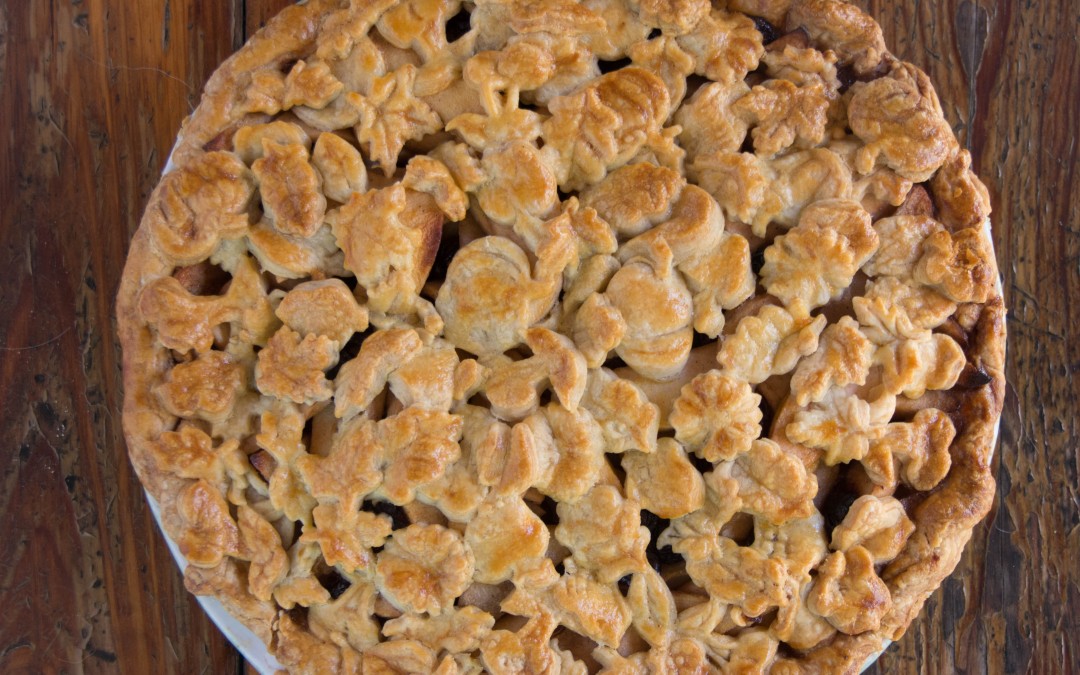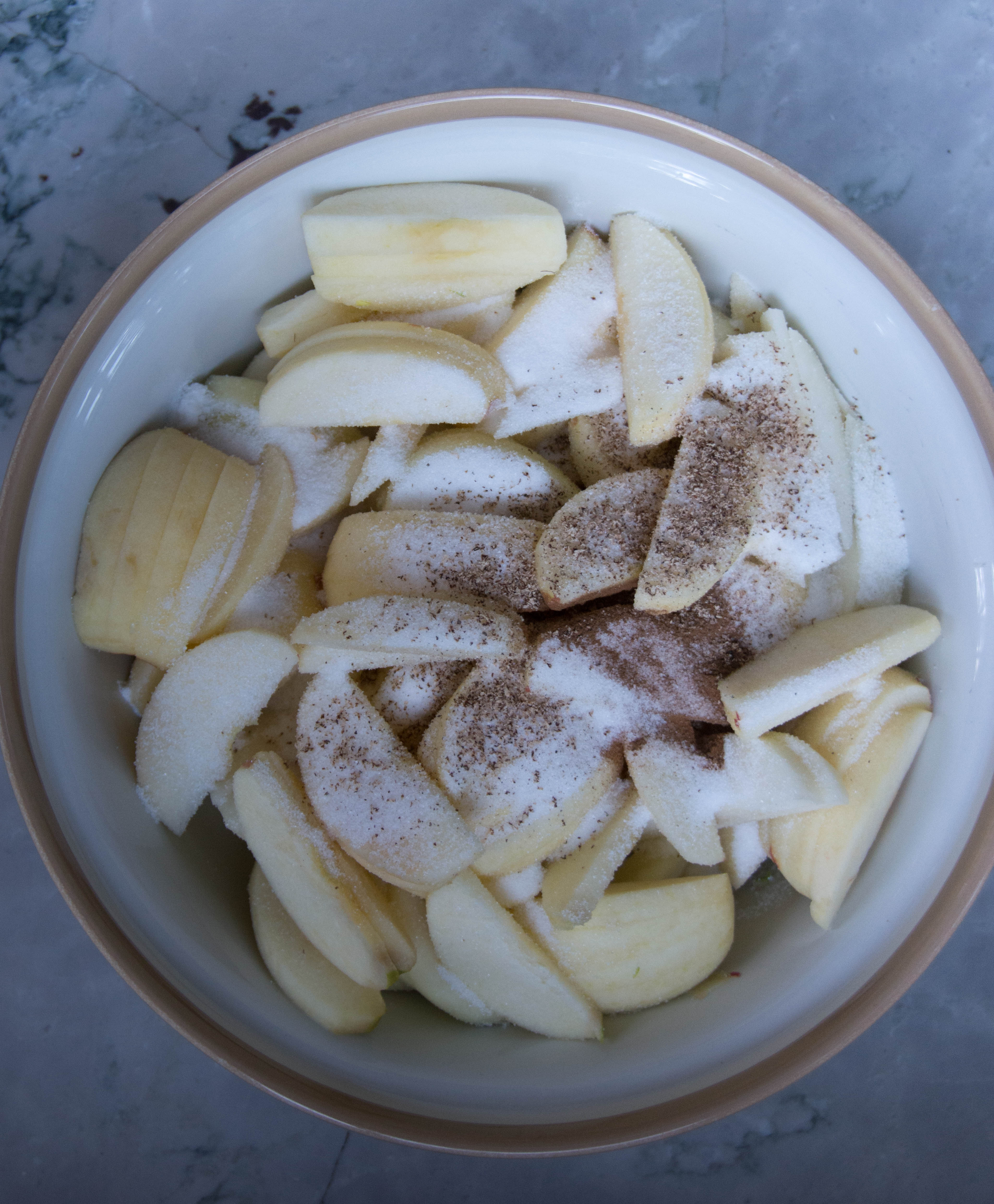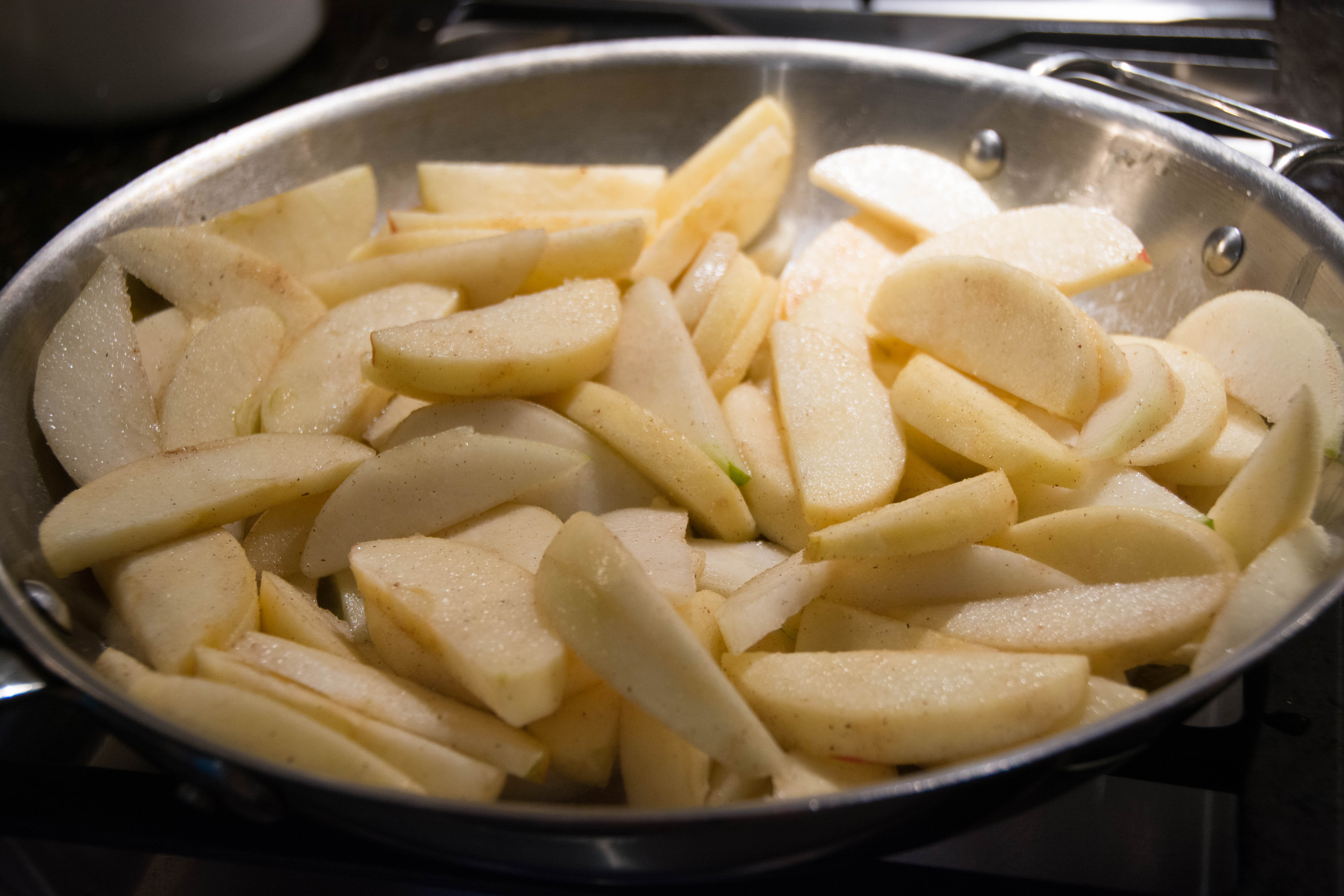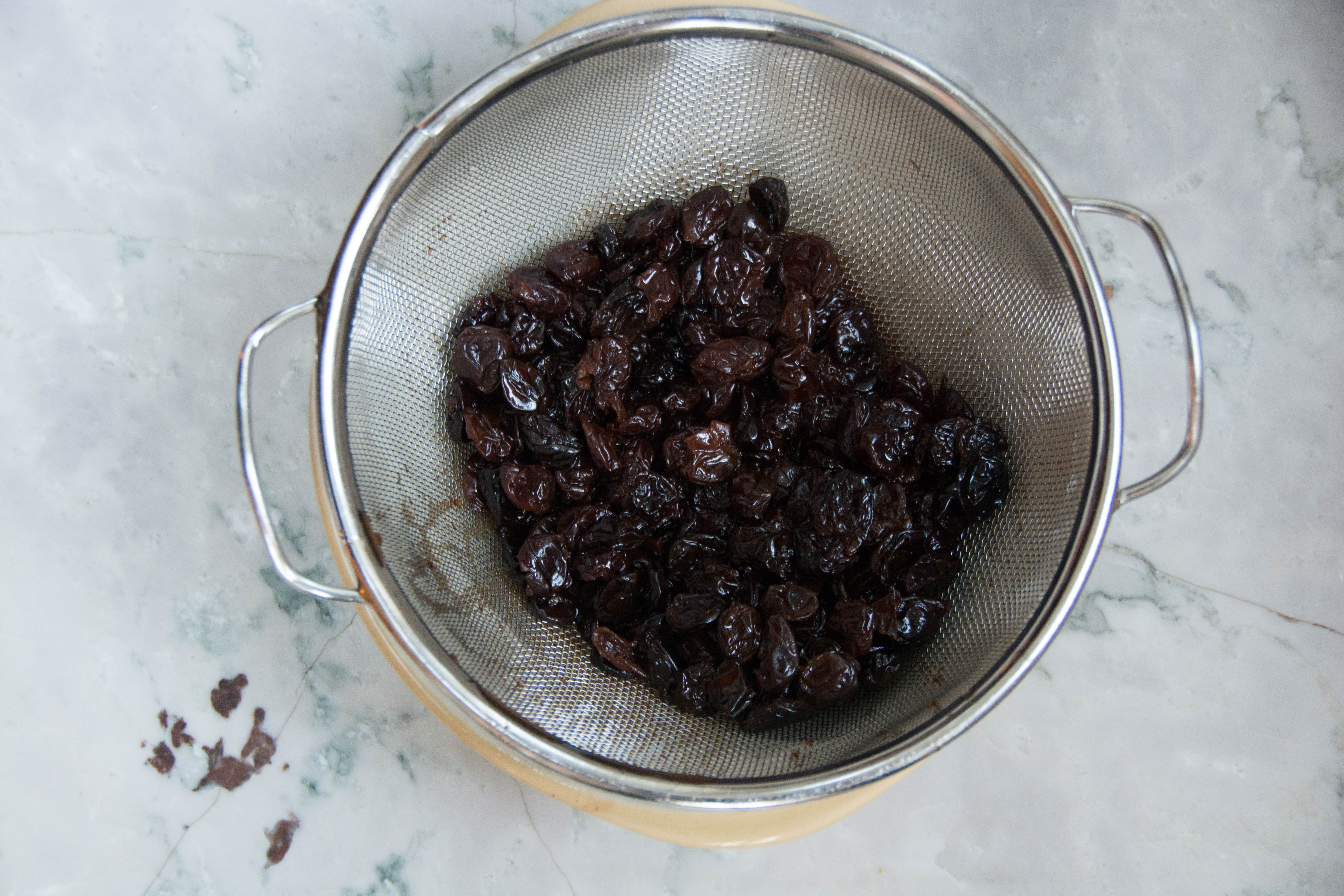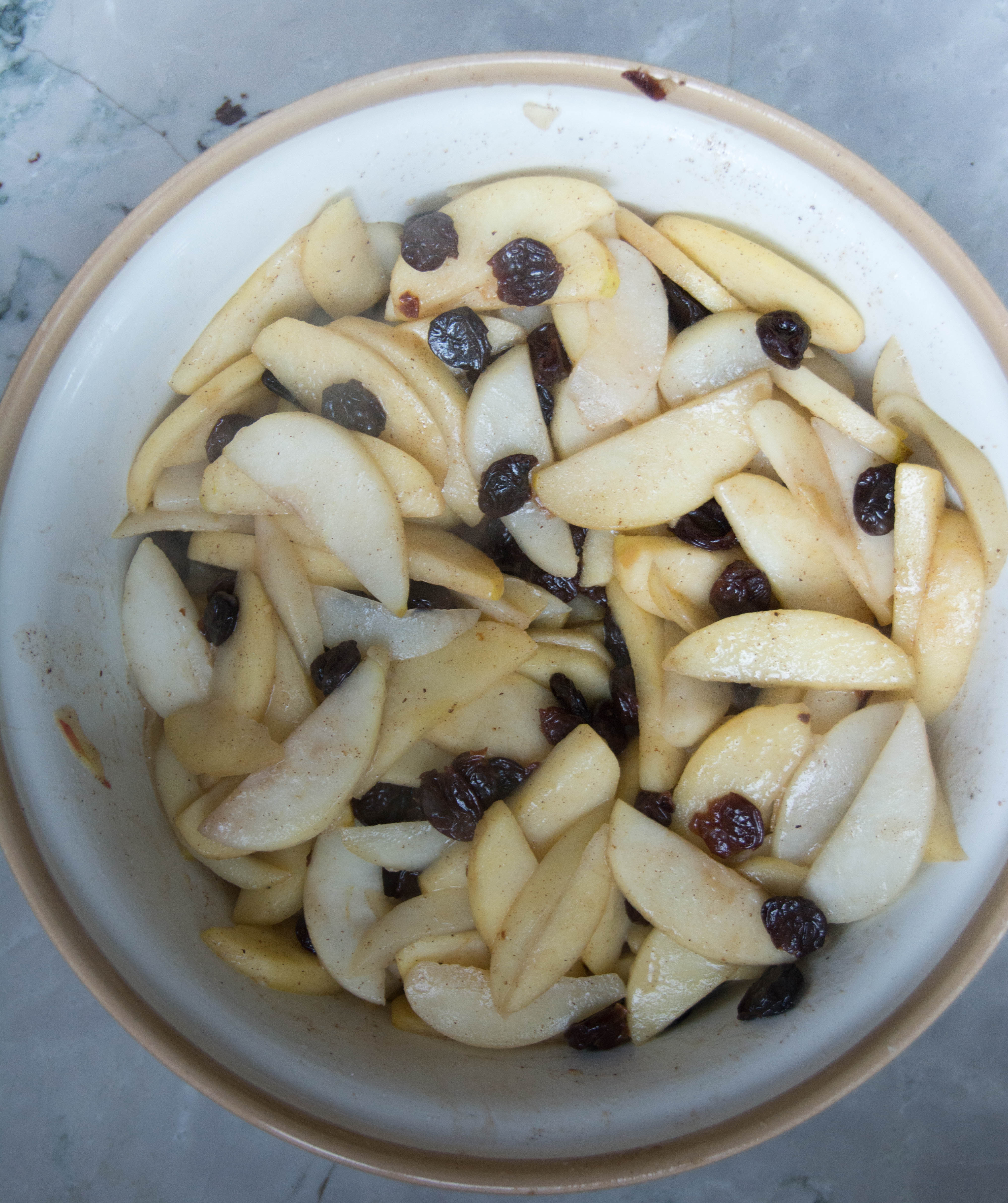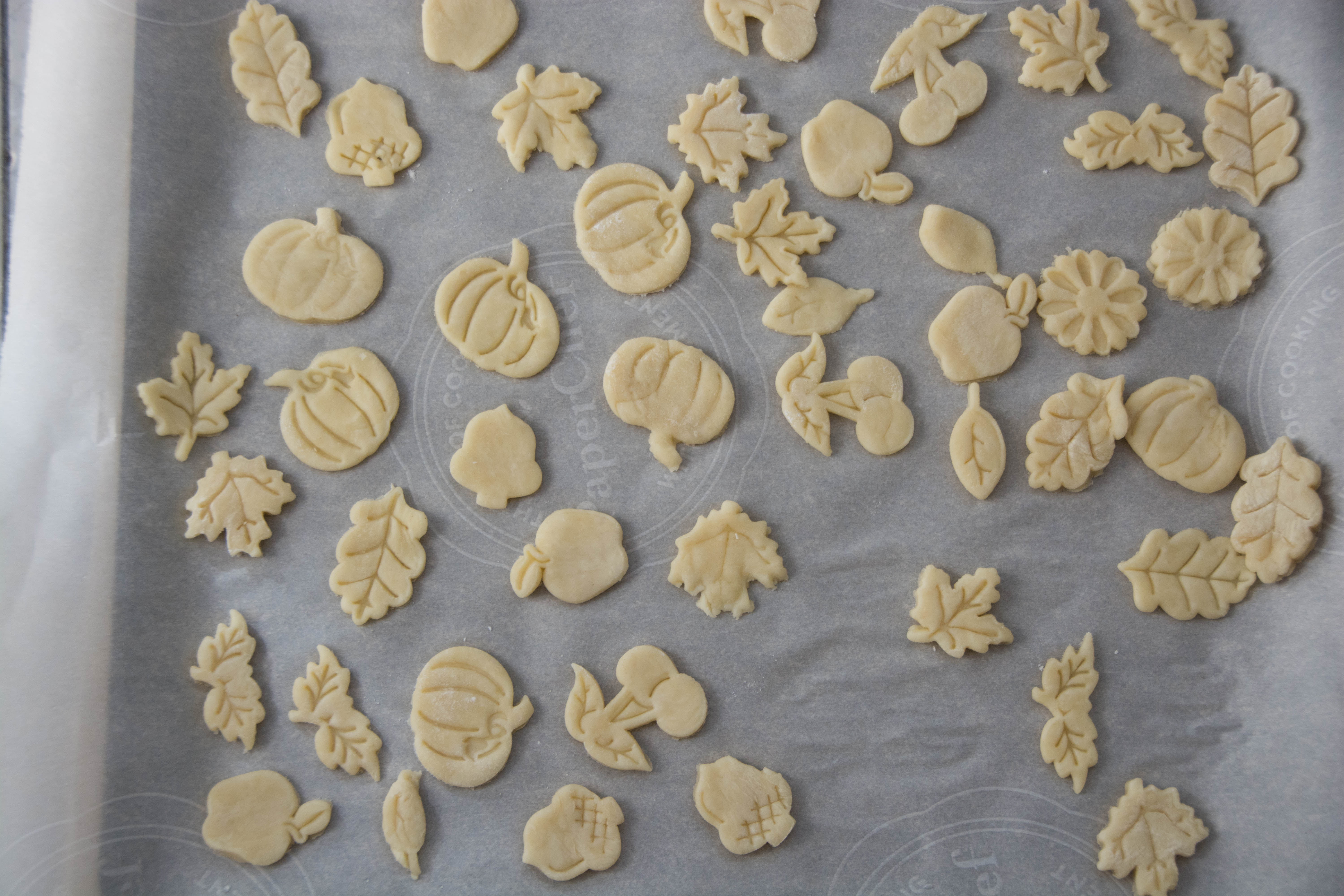This recipe is adapted from one from Fine Cooking, The original is intended to be made ahead and frozen, which is what attracted me to it in the first place. I became dubious about how well the pastry would hold up, however, particularly as no pre-cooking of the filling was called for. Sure enough, the reviews reported that the pastry was so-so and that the filling had cooked down while baking, leaving a big gap in the pie. The filling was reported to be delicious, though. Ok – make some modifications and go from there!
I used Julia Child’s recipe for Pâté Sucrée as I know it’s foolproof, especially when made in a food processor (oh, those years I fiddled away with a pastry cutter and a big mess on the floor…). I use an 11″ deep dish ceramic pie plate from Williams Sonoma (now discontinued, but the attached link is a lovely variety of sizes and shapes), and increased the proportions of the filling accordingly. If you’re using a regular 8 or 9″ metal pie plate, you’ll have enough pastry and filling leftover for another small pie or some turnovers.
The pastry cut-outs are also from Williams Sonoma. They’re incredibly popular with the grandchildren.
- Assemble the ingredients
- Apples and Pears
- Add the sugar and spices
- Saute the apples and pears
- Drain the cherries
- Mix the cherries with the cooked apples and pears
- Arrange the fruit in the pie plate
- Cut out the pastry shapes
- The shapes are easy to make
- Assemble the shapes and brush with egg mixture
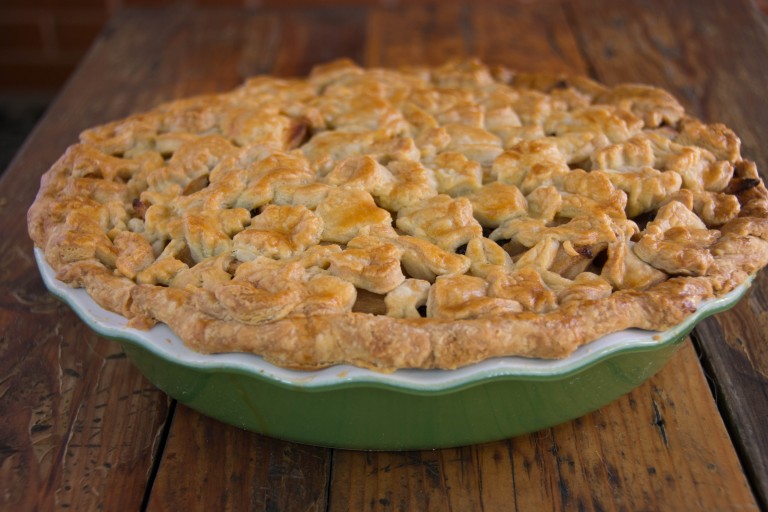
Apple, Pear and Dried Cherry Pie
A wonderful combination of flavours. The filling is delicious, not too sweet and of sufficiently large proportion that leftover pie can arguably pass as breakfast!
- Total Time: 120
Ingredients
For the Pâté Sucrée
- 240 g or 2 c unbleached all-purpose flour
- 25 g or 2 tbsp granulated sugar
- 1/2 tsp kosher salt
- 170 g or 6 oz very cold unsalted butter, cut into 1/2-inch cubes
- 57 g or 2 oz chilled vegetable shortening, cut into 1/2 inch cubes
- 2 tbsp to 1/4 c ice water
For the filling
- 200 g or 1 c granulated sugar
- 283 g or 2 c dried tart cherries
- 4 lb (about 8 large) firm, tart apples (such as Braeburn, Jonagold, or Pink Lady)
- 2 lb (about 6 medium) firm-ripe pears (such as Anjou)
- 85 g or 3 oz all-purpose flour
- 1 tsp ground cinnamon
- 1/2 tsp ground nutmeg
- Pinch kosher salt
For baking
- 1 egg yolk, beaten
- 2 tbsp heavy cream or milk
Instructions
- Position a rack in the lower third of the oven and preheat the oven to 350ºF or 325ºF Convection.
Make the pastry
- Put the flour, sugar, and salt in the bowl of a food processor—pulse for a second or two to blend. Add the butter and pulse until the mixture is crumbly and the largest pieces of butter are no bigger than a pea (about 10 seconds). Add the shortening and pulse a few more times until it is incorporated. With the food processor running, drizzle 2 tbsp of the ice-cold water through the funnel and pulse until the pastry just pulls together in a shaggy mass, adding more water, if needed, Remove the pastry, pat it into a ball and refrigerate. Repeat, so you have two balls of dough. Let the pastry rest in the fridge for at least an hour.
Make the filling
- In a small saucepan, combine 1/2 cup of the sugar with 1 cup water; bring to a boil. Add the dried cherries and simmer for 3 minutes. Set aside to cool to room temperature. Drain. (Save the liquid to drizzle on ice cream or use with club soda for a delicious Italian soda).
- Peel, core, and cut the apples and pears into 1/3-inch-thick slices. In a large bowl, toss the apples and pears with the remaining 1/2 cup sugar, flour, cinnamon, nutmeg, and salt. Transfer to a large skillet.
- Saute the apples and pears until fragrant and slightly soft (about 5 minutes). Transfer them back to the bowl, scraping the skillet to get all of the sugary syrup. Add the drained cherries and toss gently to combine. Set aside to cool while you prepare the pastry, occasionally stirring to release the heat.
Assemble the pie
- On a floured work surface, roll out one piece of pastry into a 14-inch circle, turning the pastry and flouring as necessary to prevent sticking. Transfer the pastry to an 11-inch deep ceramic pie plate, fitting it into the plate without stretching. Trim so that there is 1 inch of pastry hanging over the edge of the plate. Fold the edge back up over the rim of the pie plate and crimp it with your fingers, so the doubled pastry edge is even with the pie plate edge.
- Roll out half of the other piece of pastry. Using small piecrust cutters, cut out a variety of shapes and place them on a cookie sheet lined with parchment paper. You can reuse the remaining pastry once, then discard the scraps. Roll out the remaining half and repeat. You’ll have two full cookie sheets of pastry shapes.
- Pour the filling into the pie shell and press down gently with your fingers to arrange it evenly. (This will keep the apples from poking holes in the top crust.)
- Starting at the outside edge of the pie, work your way around the outer edge, arranging the pastry shapes so that they overlap slightly. Continue adding shapes in concentric circles until you reach the middle of the pie.
- Brush the pastry with the whisked egg and milk mixture and bake the pie until golden brown (at least an hour, likely closer to an hour and a half). You may need to put a foil sleeve over the edge of the pastry if it’s browning too quickly.
Notes
- I’ve tried to double the pastry recipe in one go, but it’s simply too much for the poor food processor. It labours away and the pastry ends up in a soggy mess. I’ve found that it’s better to just make the recipe twice. It doesn’t take long and there is no need to wash anything out in between batches.
- Don’t be intimidated by cutting out the pie shapes and arranging them. It’s loads of fun, and little people love to get involved in cutting out and arranging the pieces.
- If you’re uncertain, lean towards baking the pie longer. Better a bit crispy than undercooked.
- Prep Time: 60
Nutrition
- Serving Size: 12

